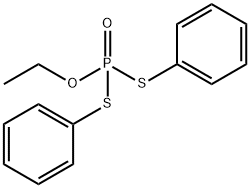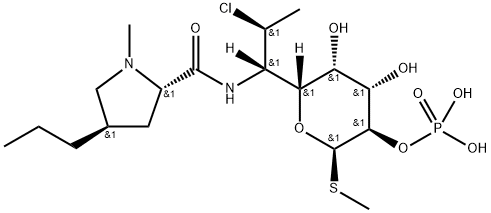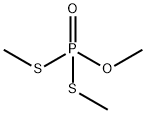Edifenphos
Synonym(s):O-Ethyl S,S-diphenyl phosphorodithioate
- CAS NO.:17109-49-8
- Empirical Formula: C14H15O2PS2
- Molecular Weight: 310.37
- MDL number: MFCD00078673
- EINECS: 241-178-1
- SAFETY DATA SHEET (SDS)
- Update Date: 2024-12-18 14:15:30

What is Edifenphos?
The Uses of Edifenphos
Edifenphos is a foliar applied contact fungicide that provides both protective and curative control of rice blast diseases caused by Pyricularia oryzae. It also controls ear blight and stem rot in rice.
The Uses of Edifenphos
Fungicide.
Definition
ChEBI: An organic thiophosphate that is the O-ethyl-S,S-diphenyl ester of phosphorodithioic acid. Used to control a variety of fungal diseases on rice including blast, ear blight and stem rot. Edifenphos i moderately toxic to mammals and fish but poses more of a risk to aquatic invertebrates.
Metabolic pathway
Hydrolytic cleavage of the P-0 and P-S linkages affords the major degradation and metabolic pathways of edifenphos. A unique transesterification reaction yielded tri-S-phenyl and di-O-ethyl phosphorus esters as minor products in soil and plant test systems (Scheme 1).
Degradation
The hydrolytic DT50 values of edifenphos (1) at pH 7 and 9 at 25 °C were 19 and 2 days, respectively (PM). [35S]Edifenphods egraded rapidly in aqueous solution when exposed to UV light at 25-28 °C [DT50 ca. 3 days (light exposed) vs. 19 days (dark control)]. Cleavage of the P-S linkage is the primary degradation pathway. Thiophenol (2) was further oxidised to form diphenyl disulfide (3), possibly during sample extraction, isolation and analysis. Stepwise cleavage of the P-S and P-O linkages yielded O-ethyl S-phenyl hydrogen phosphorothioate (4), S-phenyl dihydrogen phosphorothioate (5), benezenesulfonic acid (6) and sulfuric acid as major 35S-containing products, whereas O-ethyl dihydrogen phosphate (7) and phosphoric acid were recovered from the phosphorus portion of the molecule (Murai, 1977).
Toxicity evaluation
Edifenphos shows no delayed neuropathic symptoms. Safety intervals between spray and harvest for rice are 21 days in Japan with 0.2 mg of MRL (Maximum Residue Limit).
Properties of Edifenphos
| Melting point: | 25°C |
| Boiling point: | bp0.01 154° |
| Density | d420 1.23 |
| vapor pressure | 1.3 x 10-2Pa (20 °C) |
| refractive index | nD22 1.61 |
| storage temp. | 0-6°C
|
| form | liquid |
| Water Solubility | 56 mg l-1 (20 °C) |
| Merck | 13,3547 |
| BRN | 1988797 |
| CAS DataBase Reference | 17109-49-8(CAS DataBase Reference) |
| NIST Chemistry Reference | Phosphorodithioic acid, o-ethyl s,s-diphenyl ester(17109-49-8) |
| EPA Substance Registry System | Edifenphos (17109-49-8) |
Safety information for Edifenphos
| Signal word | Danger |
| Pictogram(s) |
 Skull and Crossbones Acute Toxicity GHS06  Environment GHS09 |
| GHS Hazard Statements |
H317:Sensitisation, Skin H410:Hazardous to the aquatic environment, long-term hazard |
| Precautionary Statement Codes |
P261:Avoid breathing dust/fume/gas/mist/vapours/spray. P273:Avoid release to the environment. P280:Wear protective gloves/protective clothing/eye protection/face protection. P301+P310:IF SWALLOWED: Immediately call a POISON CENTER or doctor/physician. |
Computed Descriptors for Edifenphos
New Products
Tert-butyl bis(2-chloroethyl)carbamate (S)-3-Aminobutanenitrile hydrochloride N-Boc-D-alaninol N-BOC-D/L-ALANINOL 3-(2,4-Dimethoxybenzyl)dihydropyrimidine-2,4(1H,3H)-dione 6-Bromo-3-iodo-1-methyl-1H-indazole N-octanoyl benzotriazole 3,4-Dibenzyloxybenzaldehyde 4-Hydrazinobenzoic acid Electrolytic Iron Powder 1,1’-CARBONYLDIIMIDAZOLE R-2-BENZYLOXY PROPIONIC ACID 4-HYDROXY BENZYL ALCOHOL 1,1’-CARBONYLDI (1,2-4 TRIAZOLE) S-2-CHLORO PROPIONIC ACID (2-Hydroxyphenyl)acetonitrile 4-Bromopyrazole 5-BROMO-2CYANO PYRIDINE 5,6-Dimethoxyindanone 5-broMo-2-chloro-N-cyclopentylpyriMidin-4-aMine N-Boc-L-proline methyl ester 2-(BOC-Amino)4-picoline 1-(4-Methylphenylsulfonyl)-1H-1,2,3-benzotriazole 1-(2-Chlorobenzyl)-4-nitro-1H-pyrazoleRelated products of tetrahydrofuran








You may like
-
 Edifenphos CAS 17109-49-8View Details
Edifenphos CAS 17109-49-8View Details
17109-49-8 -
 55441-95-7 2 2-BIS(2-HYDROXYETHOXY)-1 1-BINAPHTHYL 99%View Details
55441-95-7 2 2-BIS(2-HYDROXYETHOXY)-1 1-BINAPHTHYL 99%View Details
55441-95-7 -
 Ste-Glu-AEEA-AEEA-OSUView Details
Ste-Glu-AEEA-AEEA-OSUView Details
1169630-40-3 -
 1446013-08-6 Fmoc-His-Aib-OH TFA 98%View Details
1446013-08-6 Fmoc-His-Aib-OH TFA 98%View Details
1446013-08-6 -
 127464-43-1 99%View Details
127464-43-1 99%View Details
127464-43-1 -
 Chloro Uracil 99%View Details
Chloro Uracil 99%View Details
1820-81-1 -
 2-ETHYLPYRIDINE 100-71-0 99%View Details
2-ETHYLPYRIDINE 100-71-0 99%View Details
100-71-0 -
 13162-05-5 99%View Details
13162-05-5 99%View Details
13162-05-5